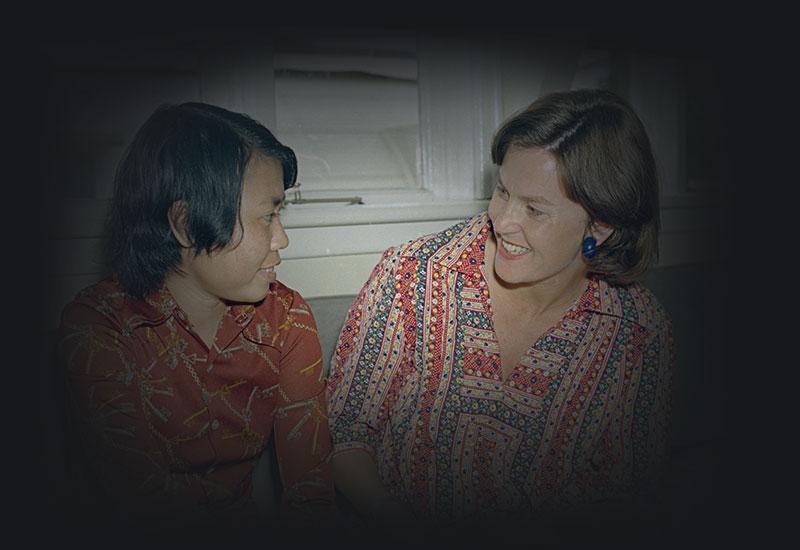Erfan Daliri: Community development has been a part of my life since before I was even born. I mean my father was doing that sort of work in India. It was a reason why we moved from Melbourne to Townsville. So growing up it's all I really knew was my father working with indigenous communities, with newly settled refugees. So it just became an automatic part of life, almost like a language that you learn. It was a way of life for us.
Joseph Assaf: When I first arrived I went and worked in a factory and I wanted to learn English. But it took me quite some time – I would say weeks, before I knew which one of the languages that I was hearing was English. Because no one spoke English in the factory. They spoke every other language. So I asked how many of these people are in the country? And at the time I was told it is about 20 percent.
There was a group from ... Ecuador speaking Spanish, there were Arabic speakers. There were some Maltese, there were Italians, there were Greeks. So I started learning a few words in Spanish to communicate with those Spanish migrants. And Maltese is very close to Lebanese – a few words in there.
This was noticed by the boss. He came to me and he said 'I saw you, speaking to these people and helping them'. I said 'Well I do what I can, learning few words to help them'. So he gave me an extra 5 dollars a week. Because he saw me, how I was helping other people. So I thought well, this is a great encouragement. I'm going to be the communicator at large with Australia.
Sophia Kallos: Actually I was pretty interested in English language, so always listening. Looking at people like I do to you now. In the face, in the eyes, and I picked up the language pretty, pretty fast.
And also I went and worked for a Hungarian lady. She used to put the radio on to say to me 'You listen.' Some series was on the radio you know like a theatre? And I was listening and sewing. And so I became learning the language.
And then when I had my children I had to read the books they were reading, to see if they were doing well. That's how I picked it up.
Seraphin Nyirenda: The Salisbury council organised the event for new arrivals. They were looking for interpreters, translators, everywhere. They couldn't find any having 2, 3 languages, who can speak 3, or more than 3 languages and I said, 'I can do that!' They said, 'Are you really sure?' I said, 'Yes I'm sure I can do that. I can speak 5 languages myself.' Say 'Wow is that true?' 'Yes.' 'Okay, come and help us.'
Yeah, that was my first job in Australia and I loved it. Until now I still working for Centrelink, just as something as a contractor. Anyway, so you don't earn too much money but at least you are, you are helping the connection between the officers and the client. I mean, to me that's good.
Joseph Assaf: When you have almost a quarter of the population, influenced by languages other than English and culture. Then when you communicate with them, you need to communicate in an effective way. You need to understand the culture and the language of your audience. So with my wife, we started in Australia – if not the world's first – multicultural communication agency.
Noonee Doronilia: I started writing when I was pregnant with my first child. One of my biggest plays was called Manila Takeaway. It's about the Filipino women who live in Mount Isa who are married to the miners there.
I was just amazed by the remoteness. Again it's the whole theme of you are alone in a place. And they were like ... They would have felt so much more alone than I have in such a remote area. And their husbands, usually some of them are, you know, Australian-born. But a lot of them weren't. They were actually coming from another country. Eastern European country or I don't know, from somewhere in the world who came to Mount Isa to mine.
I had never been in a mining town in my life. I had such an amazing time because they invited me to their homes. They wanted to tell their stories. The whole sense of coming together ... of working through their own ... their own experiences in life. Their, their grief, their sorrow, their happiness and the sense of resilience that they've had.
Erfan Daliri: It wasn't until about 4 or 5 years ago that I ... wanted to do something different to community development. I got a little bit disappointed and disheartened with what was happening in social change in general.
So I started writing about what I've learnt and the contradictions that I've unravelled, and, you know, the stories I've come across. Whether it's working out your identity or coming to deal with ... you know, with race issues, or whether it's of a more spiritual nature of what is the true self, or where do we come from, where are we going? I guess I'm still doing community development, just in a different sense. I write and I share how I try and change people's hearts, minds and opinions or open them to new ideas through my writing.

